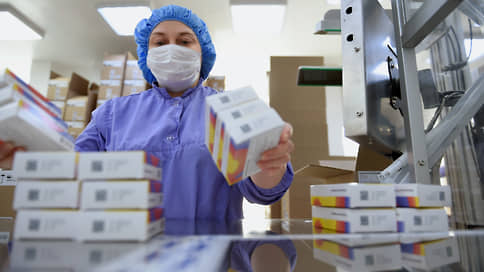Substances will be determined by nationality – Newspaper Kommersant No. 174 (7375) of 09/21/2022
[ad_1]

In Russia, it is necessary to introduce the labeling of pharmaceutical substances from which medicines are made, according to the Association of Pharmaceutical Manufacturers of the Eurasian Economic Union (AFPEAES). The organization proposed to the relevant departments to start recording data on the movement of substances in a special information system in order to ensure control over their origin and provide pharmaceutical manufacturers with a full cycle of preferences in public procurement.
In the Russian Federation, it is necessary to create a system for tracking the origin of intermediates (intermediate substances) and pharmaceutical substances – such a proposal was made by the Association of Pharmaceutical Manufacturers of the Eurasian Economic Union (AFPEAEU) during the Biotechmed forum.
As follows from the document prepared by the organization (Kommersant has it), the Ministry of Industry and Trade is proposed to create a unified information system that would store data on capacities, material balance, imports of pharmaceutical substances and intermediates into the country. They could be formed in the form of several registries – including registries of full-cycle drug series, as well as the production capacities of local manufacturers. The source of information about the origin of pharmaceutical substances, if they are produced or purchased domestically, could be data from the Federal Tax Service (contracts, payment documents, acts, invoices). In the case of import from abroad, such information could be provided by the Federal Customs Service.
At the suggestion of the association, at the stage of using pharmaceutical substances for the manufacture of finished drugs, data on the origin of Russian substances could be entered into a QR code, which is now used to label drug packages. This would allow traceability of data from the substance lot to the drug lot. As a result, information about the origin of the substance from which the drug is made would fall into both the labeling system and the automated system of Roszdravnadzor with data on medicines released into civil circulation.
As Aleksey Kedrin, Chairman of the Board of AFPEAES, explained at the forum, the introduction of such a system will automate control over the origin of active pharmaceutical substances, as well as ensure the prevention of unjustified provision of preferences at state auctions. Recall that earlier the Ministry of Industry and Trade proposed to give an advantage to companies that have the capacity for the production of a full cycle (from the molecule of the active substance to the production of the finished drug) in one of the EAEU countries when public procurement of medicines. If such a company enters the auction announced by state medical institutions, it should automatically become the winner (for more details, see Kommersant dated November 16, 2021).
However, according to Kommersant’s sources in the industry, for almost a year the Ministry of Industry and Trade has not completed work on such a bill. “The department sees the risks that it carries, and they want to minimize them,” the interlocutor told Kommersant. It should be noted that both foreign and domestic companies, as well as patient organizations, opposed such new rules – they criticized the proposal of the Ministry of Industry and Trade not only in connection with the risk of monopolies (since most of the substances in the Russian Federation are imported from abroad), but also from abroad. vague definition of the concept of “full-cycle production”. The AFPEAES proposals could partly solve these problems, but it is not yet clear what costs the implementation of the new system will require at the national level. The launch of labeling of finished drugs, we recall, was accompanied by statements by pharmaceutical companies about a significant increase in costs for re-equipment of production lines and the purchase of labeling equipment. Government spending on the pilot project alone in 2017 amounted to about RUB 250 million.
[ad_2]
Source link






